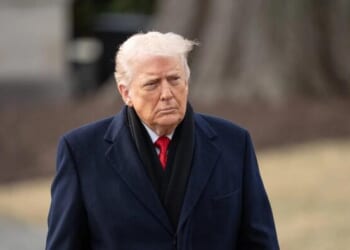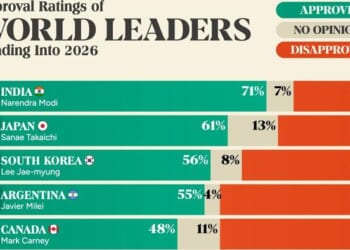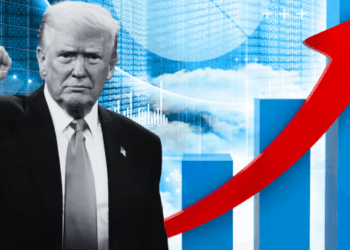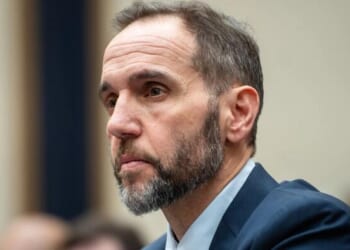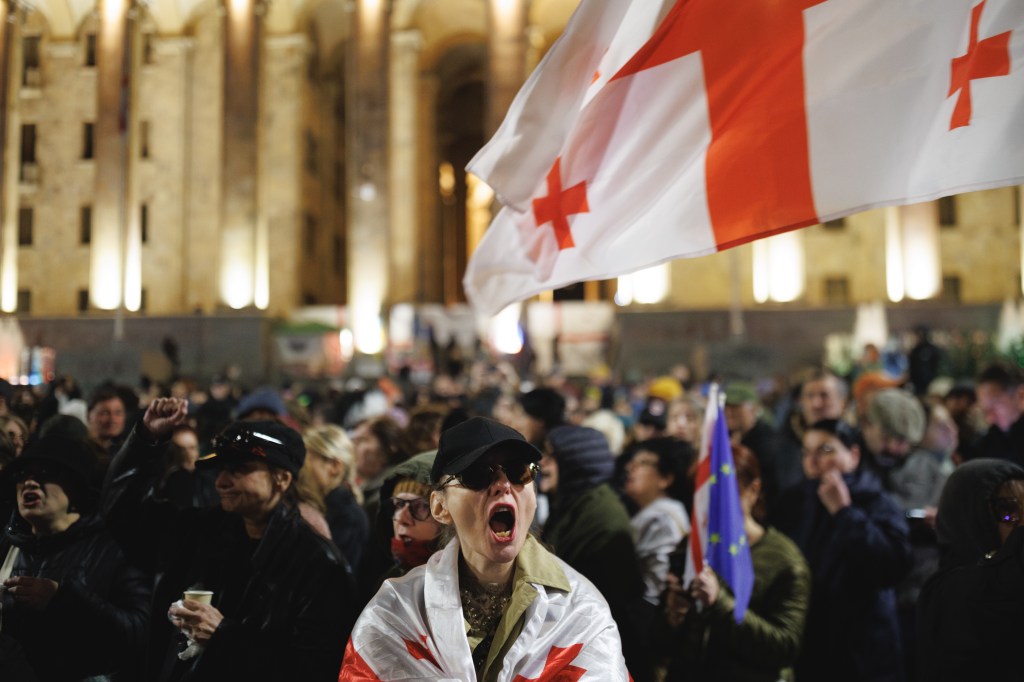
One year ago, the European Parliament, a number of European capitals, and the United States criticized the fraudulent parliamentary elections in the Republic of Georgia. The European Parliament called for new elections, and the administration of then-President Joe Biden expressed concern over “democratic backsliding” after the Georgian Dream party, led by oligarch Bidzina Ivanishvili, claimed victory despite international observers calling the elections “not in line with international democratic principles.”
Now, as Ivanishvili makes good on his campaign promise to start a “Nuremberg trial” to prosecute and ban the pro-American opposition, and as he enables a return to Russia’s sphere of influence, the West has dropped the ball.
The Georgian people, however, have not been silent. They’ve been turning out in the streets every night to protest for nearly a year. Polls routinely show that well over two-thirds of Georgians support joining NATO and the European Union. It’s not too late to stand with them, for they need and deserve the support. But standing with Georgia also serves Western interests: To abandon Georgians in their struggle to keep their country on a democratic trajectory, anchored in Western institutions like the EU and NATO, would be to risk losing Georgia to the Russians and increasingly to the Chinese. As it stands, Beijing is looking to exploit Georgia for its Belt and Road Initiative, while Moscow delights in its expanding influence.
Democratic backsliding.
Ivanishvili and Georgia Dream have been taking Georgia in the wrong direction for several years, but opposition to their efforts picked up steam following the October 2024 parliamentary elections.
Most opposition parties have boycotted parliament until new elections can be held. And for more than 300 straight days, hundreds of thousands of Georgians have taken to the streets to press for new elections and protest the government’s reorientation away from the West and toward Moscow. They gained renewed energy following sham local elections earlier this month, when Georgian Dream won again after rigging the election framework and throwing many party leaders in jail.
Georgian Dream now runs the country as a one-party regime. Ivanishvili’s puppet government—he holds no official position but is the de facto leader—has declined to discuss a way forward with the opposition and civil society leaders and instead chosen to persecute them. Using Russian-style legislation, it has tagged pro-Western and pro-democracy non-governmental organizations as “foreign agents,” frozen their bank accounts, and opened investigations with an apparent view toward shutting them down. And it has used more stringent measures against its political opposition.
Nine opposition leaders have been jailed along with dozens of other opposition figures, after unfair trials in connection with the anti-government protests. Following through on Ivanishvili’s campaign pledge to start a Nuremberg-type process, on October 28 the Georgian Dream-led parliament asked the Constitutional Court to ban three major opposition parties, all pro-Western. So far, it has refrained from utilizing an earlier law to forbid those associated with them from voting, forming new political parties, or holding public office.
Not surprisingly, Russian officials have welcomed the crackdown, falsely claiming the protests have been directed and supported by Western governments. Georgian Prime Minister Irakli Kobakhidze also echoed such accusations. Georgian Dream spouts absurd Kremlin propaganda that the United States seeks to drag Georgia into the war that Russia started against Ukraine. The party leaders rhetorically attack Western officials, ambassadors, and institutions. Politically, Georgia, once a stalwart partner of the U.S., is now firmly in Russia’s camp under the current government, to the point where Russian nationalist Alexander Dugin wrote on Telegram that “Georgia is the only country in the South Caucasus where things have gotten better for us, not worse.”
Elsewhere in the South Caucasus.
Things are indeed worse for Russia in the other two South Caucasus countries, Armenia and Azerbaijan. Both nations, once dependent on Russia for different reasons, now seem determined to cut their security ties to Moscow.
The two countries have fought over Nagorno-Karabakh, an ethnic Armenian enclave within Azerbaijani territory, off and on for over three decades. Although the United States and Russia, together with France, agreed in 1994 to monitor a ceasefire and together manage the conflict, in recent years Washington and Paris lost interest in taking a role. Russia became the sole mediator and weapons dealer, providing arms to both sides.
That dynamic changed in 2023. Azerbaijan ended its dependence on Russian arms and turned to NATO member Turkey, which supplied drones and other precision weapons, allowing Azeri forces to retake the region in a few days.
And Armenia soured on Moscow after it failed to come to its assistance during the 2023 attack by Azerbaijan, despite Russia’s long-standing treaty commitments with Armenia.
With Russia tied down in Ukraine and out of the regional picture, President Donald Trump’s offer to host an Oval Office peace summit earlier this year came at an opportune time. The United States convinced the sides to initial a peace agreement in part by offering to broker a transport corridor across Armenia, called the Trump Route for International Peace and Prosperity (TRIPP), linking Azerbaijan with its exclave of Nakhchivan.
The White House should celebrate its role in ending hostilities between the two countries and eroding Russia’s hegemony in the region. But it is missing an opportunity in Georgia, where there is another, perhaps greater geostrategic prize: the establishment of a Middle Corridor, a major transport route for Caspian energy and Central Asian goods that doesn’t run through Russia or Iran.The keystone for the Western outlet of the Middle Corridor—or the Transcaspian International Transport Route—would be a deep-sea port on Georgia’s Black Sea coast, long a goal of U.S. policymakers.
The lack of Western attention to and engagement with Georgia has meant not only that Russia has pulled Georgia back into its orbit, but a new hegemon has also emerged there: China, which sees Georgia as an important component of its Belt and Road Initiative. Under Georgian Dream, Chinese projects and exports have skyrocketed. In 2023, Georgia Dream signed a strategic partnership agreement with China, with Prime Minister Irakli Kobakhidze lauding the Communist-led government for its steady hand in promoting peace and stability around the world.
But most alarmingly, earlier this year Georgian Dream awarded the contract to build the Black Sea deep-sea port to a China-led construction company, after canceling a similar contract with a Western consortium. Fortunately, Chinese construction has not yet begun. Georgia’s leader is transactional and might be open to a better offer. But until the West recognizes it has a stake in ensuring Western access to Caspian energy and other resources, the Middle Corridor may not be controlled by Russia or Iran, but by China.
What the West should do.
The Georgian people will determine their own leaders and future if given a fair shot at doing so. That is where the United States and Europe factor in, because they can help level the playing field, which is unfairly and disproportionately tilted toward Georgian Dream and its supporters in Russia and China.
The United States and European allies should refuse to recognize the Ivanishvili-controlled government as legitimate and insist on new elections. Nor should the West recognize Mikheil Kavelashvili as the country’s president, given that he was installed by the illegitimate parliament. Salomé Zourabichvili, whose term expired in December 2024, should continue to be recognized as the country’s president until a newly elected legislature chooses a new president. (In 2018 Georgia did away with direct elections of its president in favor of a vote by an electoral college consisting of parliament and regional legislatures.)
The United States imposed sanctions on Ivanishvili last December but has taken no further action against any Georgian Dream government officials responsible for human rights abuses and corruption. Neither has the EU or the U.K. Given the financial connections Georgia’s two main banks, TBC and Bank of Georgia, have to Britain, U.K. sanctions would pack some punch.
To be clear, sanctions should be targeted against individuals responsible for Georgia’s deteriorating situation, not against the Georgian people or the country as a whole. The Trump administration should support the MEGOBARI (which translates to “friend” in Georgian) Act, passed in the House and awaiting passage in the Senate, which calls for these kinds of measures while offering support for the country.
Such moves would deliver a substantial blow to the Ivanishvili regime and provide a huge boost to the Georgian people who are putting themselves at risk by protesting. So would action by the European Union. Several member states have imposed their national sanctions on GD officials, but the EU’s executive body, the Council of Ministers has not.
As an example, the EU needs to stop its enabling behavior, such as when it welcomed the Georgian prime minister to Copenhagen last month for a summit of the European Political Community. GD officials, whether from the government or the parliament, should not be welcomed in Western nations—and they wouldn’t have been if the EU had imposed visa and asset sanctions on them.
In contrast, the EU’s legislature, the European Parliament (EP), has been a strong voice in support of embattled Georgians. On October 22, it awarded its Sakharov Prize for Freedom of Thought, named after the late Soviet dissident, to Mzia Amaglobeli (and to jailed Belarusian journalist Andrzej Poczobut). Amaglobeli, a Georgian journalist and director of online media outlets Batumelebi and Netgazeti, was arrested in January 2025 for joining anti-government protests in Georgia and sentenced to two years in prison on political grounds. Numerous other journalists have since been arrested for covering the protests.
As the EP noted in announcing its decision, Amaglobeli, Georgia’s first female political prisoner since the country’s independence and a defender of freedom of expression, “has become the figurehead for Georgia’s pro-democracy protest movement, opposing the ruling ‘Georgian Dream’ party’s regime since the contested October 2024 elections.”
The EP earlier adopted a resolution calling for the immediate and unconditional release of Amaglobeli and condemning “the Georgian Dream regime’s systemic attacks on democratic institutions, political opposition, independent media, civil society and the independence of the judiciary.” It also has called for Georgia to hold new elections following the fraudulent ones last year. The EP has been consistently outspoken in its support for the Georgian people. It’s time now for the EU’s Council of Ministers to step up support for Georgia’s pro-democracy movement and impose sanctions on the Georgian regime.
There are many problems around the world demanding the attention of Western leaders, but a little bit of attention paid to Georgia would go a long way to arresting that country’s current decline and showing support for the Georgian people, who simply want to live in a democracy rooted in Euro-Atlantic institutions.
That’s something that countries on both sides of the Atlantic should be able to get behind.







